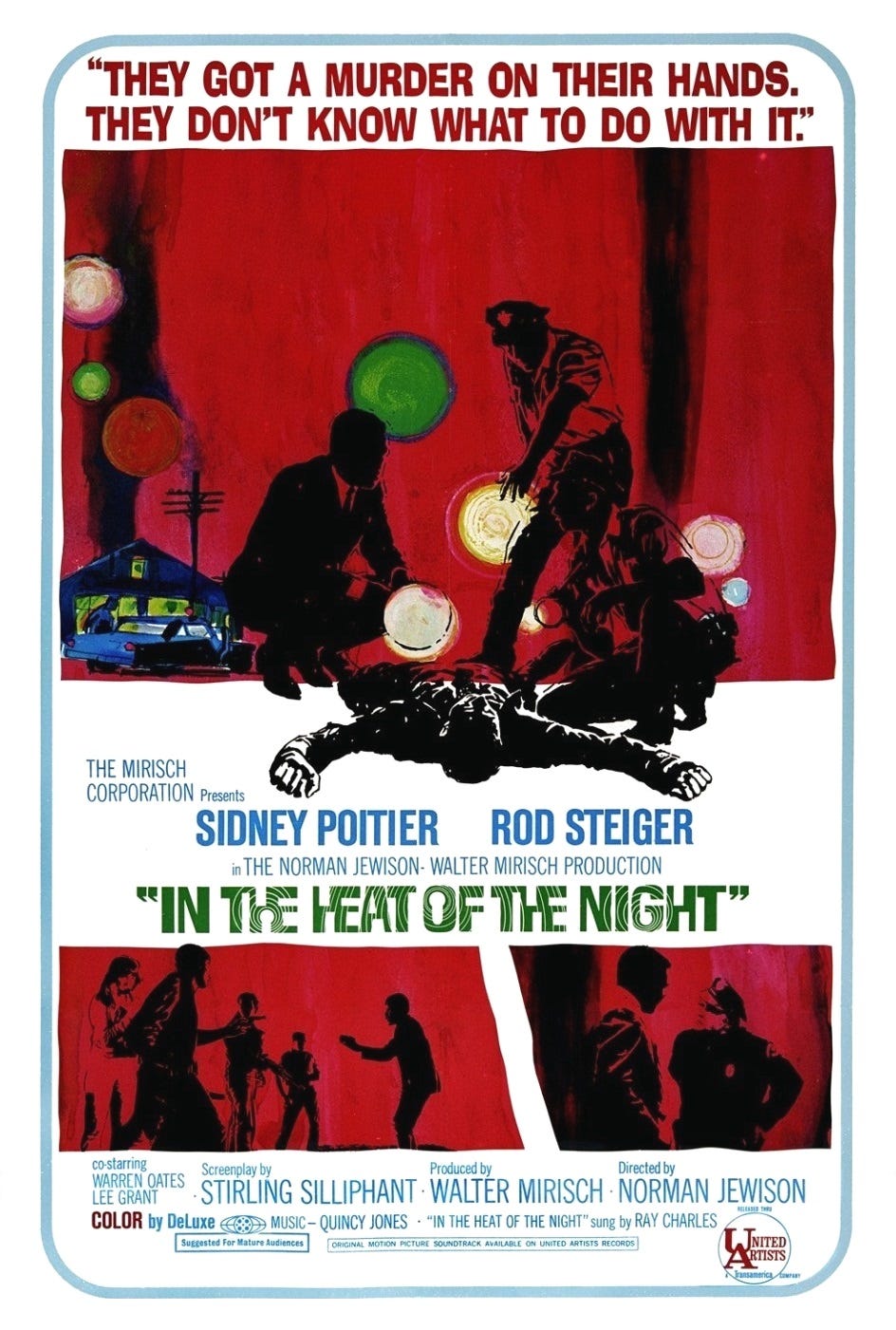About three months ago, Roy Wood Jr.—a native of my hometown Birmingham—dropped a new comedy special. It’s very good, but one bit in particular has lived in my mind ever since I saw it.
It’s a great joke about “evil white actors in civil rights movies” and the “bravery” it takes for someone like Leonardo DiCaprio to read…certain lines to someone like Jamie Foxx. If the definition of “film criticism” can be extended to include commentary that affects how you view certain films thereafter, then Roy’s observations are my favorite piece of film criticism of the last several years.*
Last month, when the legendary Sidney Poitier passed away, I knew I had to revisit In The Heat Of The Night, which I had just picked up a copy of. In The Heat Of The Night is many different things. It is, to a large extent, the sort of surface-level progressive film one might assume it is, which is why it won Best Picture at the Academy Awards. But it is also a complicated, enduring film, which is why it is in the Criterion Collection.
It also contains one of the most memorable examples of Roy Wood Jr.’s thesis. Perhaps even the earliest example. (Are there earlier examples? Probably. But we do not do “research” here at this newsletter.)
If you’ve seen the film, you probably know the moment I’m referring to. But if you haven’t, let me set the stage for you. Poitier’s character, Virgil Tibbs, is a homicide detective from Philadelphia who finds himself helping investigate an unsolved murder in Sparta, Mississippi. And part of that investigation involves questioning a local plantation owner named Endicott.
Tibbs asks a leading question that Endicott doesn’t take kindly to. And so he slaps Tibbs in the face. And it’s quite a slap. I mean, this man actually let Poitier have it. There was almost certainly a sound effect added, because he backhands Poitier and grazes him across the chin rather than connecting squarely with his cheek, but that is a real slap, folks. If you look closely, you can see movement in Poitier’s face.**
That man is Larry Gates, and I wish I could ask him what that was like. I mean, can you imagine getting cast in a decently budgeted studio film alongside a bona fide movie star—one who had just become the first Black man to win Best Actor at the Academy Awards—and not only are you playing a racist plantation owner, but your one prominent scene involves slapping the hero in the face? (Yes, he took a slap right back, but any physical pain he may have sustained was temporary, and shame can last forever.)
Gates was no Sidney Poitier, of course, but he seems like he was a nice man. He is mostly known for this film and for Cat On A Hot Tin Roof. He was in an impressive slate of Broadway productions, one of which earned him a Tony nomination. He also won a Daytime Emmy in his twilight years for a long-running role on Guiding Light. By all accounts, he lived a very fulfilling life in the performing arts and portrayed a number of complex and intriguing characters.
But his most notable legacy—the thing he will always be remembered for above all else—is playing a despicable racist and slapping Sidney Poitier in the face.*** That’s tough, folks. I just hope he didn’t have to shoot many takes on that one.
*I couldn’t not think about this joke recently as I was rewatching an absolutely unhinged Michael Fassbender in 12 Years A Slave. (I understand this is a film that most wouldn’t consider “rewatchable;” I was doing a Steve McQueen binge. [I promise.])
**My editor John pointed out that Roy Wood Jr. also did a bit about watching Oprah get slapped in Selma. He really should’ve written this piece for me.
***I wonder if it made things worse that his costar, Rod Steiger, won Best Actor at the Oscars that year for playing a character who didn’t have to slap Sidney Poitier, all while enjoying a redemption arc at the end of the film. And I wonder if Steiger himself felt any guilt for winning Best Actor for a film that clearly belonged to Poitier (who wasn’t even nominated).
In The Heat Of The Night is now streaming on HBO Max, Cinemax, and DirecTV, and it’s available to rent elsewhere.






Wild speculation here, but maybe the actor felt the need to do it. A kind of if not me then who. People need to see what's going on, what's still happening and I've been given this glorious chance to show them.. A parallel might be all the Jewish actors in Hogan's Heroes, Leon Askin, Howard Caine, John Banner and Werner Klemperer how had a Jewish father and grandparents